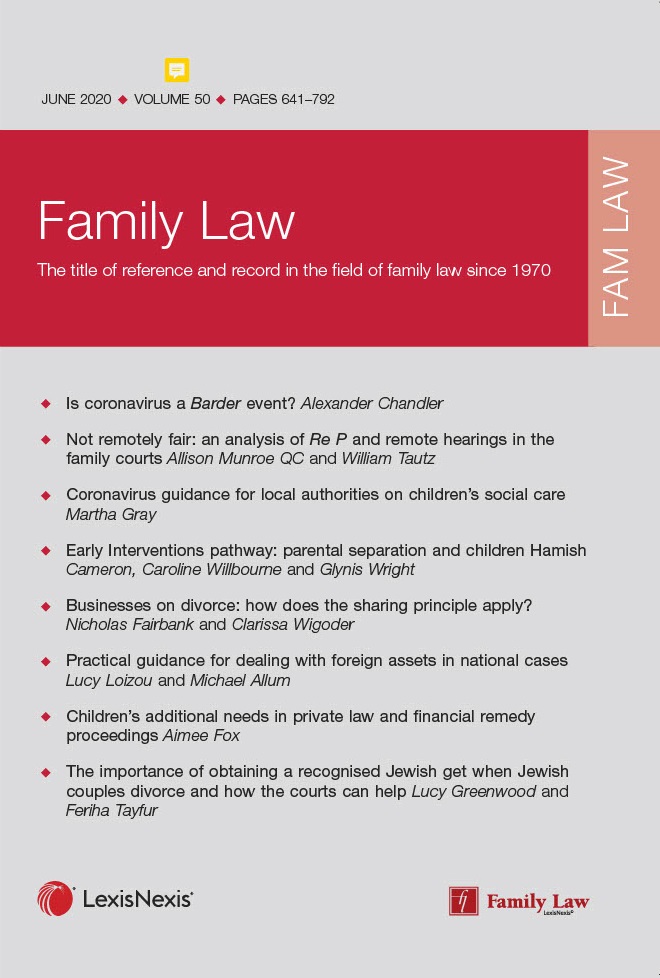Partners Lucy Loizou and Michael Allum consider the ever-increasing international movement of people and families, a significant portion of financial cases in the family courts of England and Wales now involved assets located overseas.
The authors were due to present this paper at The International Family Law Conference on 26 March 2020 before it was postponed owing to coronavirus. It has however been adapted for LexisNexis for the benefit of practitioners dealing with cases involving foreign assets. It identifies key issues to be considered at the outset and throughout any case.
Introductory Comments
In most divorce financial settlements involving entirely English-based assets, the parties (and the court if involved) need some assistance in understanding, valuing and corroborating the available resources; estate agents’ particulars to ascertain the current value of property, an accountant report in relation to the tax which would be payable in a variety of scenarios and ways to mitigate, a business valuation or a pension report. That is however just the tip of the iceberg when foreign assets are involved.
This article covers some of the most common types of overseas assets which need to be considered in financial settlements on divorce. Each type of asset throws up different considerations, but the golden rule is always to identify at the outset the assets outside the jurisdiction and what information and evidence is needed. Where possible steps should be taken to agree the issues with the other solicitors and take joint advice, although it may also be necessary to have one’s own expert in the background. Make sure any foreign assets are considered at the First Appointment. Consider arbitration if a discrete issue arises as parties can choose an arbitrator experienced in dealing with such issues, and sometimes a determination is on paper.
The family courts of England and Wales does have power to make an order in respect of a foreign-based asset, with a few exceptions such as pension orders without consent. But it will be reluctant to do so unless it knows the order will be enforceable. It is unwise to settle a case without knowing it is enforceable against foreign-based assets. A significant element therefore is not only understanding and valuing a foreign asset but knowing whether there can be effective enforcement.
Always consider offsetting claims against foreign assets, with particular difficulties in enforcement, by seeking greater claims against English-based assets. It may not often be appropriate but should always be considered.
This article does not cover income and income-based claims which can sometimes involve quite different considerations.
Real Property Abroad
- Take local advice as to the form of ownership. The foreign lawyer may be able to carry out the equivalent Land Registry search. Find out how a property can be held and whether there are any distinctive aspects as to ownership and realisation of the real property.
- If held in the name of the other party, take local advice on whether there is the opportunity to place notices or restrictions on the title pending settlement, in order to preserve assets. Also, consider the availability or necessity of worldwide freezing orders albeit bearing in mind the Court’s reluctance in English to grant these.
- Check any tax consequences that will arise on the sale or transfer of property. Many countries have property taxes on sale or transfer which may be considerably higher than the English equivalent.
- Find out how long the valuation process will take place and cost. Obtain an early valuation. Note that some countries have official valuations and separate commercial real estate valuations. The former is invariably lower and can give rise to misleading settlements. It is crucial for the valuers to understand what the English family law process requires.
- Take early advice on the enforceability of an English order on real property abroad; it may be quite different to enforcement against other foreign assets and some countries will require a local order before enforcement against local real property.
Foreign Savings and Investments
- When they have been realised or liquidated, are there any restrictions and tax consequences of taking out of the country where they are situated and then separately on bringing funds onshore. This will mean financial and tax advice from professionals both here and abroad. Some countries still have restrictions which can have significant implications on the structure of financial settlements, especially if those assets had been earmarked to meet needs arising in England
- Depending on the type of settlement envisaged, tax advice will be needed to ascertain the most tax efficient way to realise assets. Choose foreign advisors carefully. They need to be experienced and efficient
- Check valuations are up to date before finalising a settlement. The current situation with coronavirus brings this into very sharp focus as many investment portfolios have fallen significantly in value and it is too early to know how the courts will consider applications to set aside in circumstances where the asset has fallen dramatically in value as a consequence of the crisis
Offshore Trusts and Companies
These are most complicated elements in sorting out financial arrangements on divorce, with many legal and practical issues.
Enforcing, sometimes even enquiring into, offshore trusts often brings the family lawyer into conflict with highly resistant trustees and trust lawyers in the jurisdiction where the trust is situated. Similar applies to offshore companies, their directors and the law pertaining to the companies. Gathering information can be difficult. Enforcing can be very hard. Joining trustees, beneficiaries or directors can be very important.
Holding assets in offshore trusts and companies is relatively common for some families and at certain levels of wealth. It is often a facility to shelter from tax or other forms of claim, or to maintain generation ownership. During a marriage, one spouse (as settlor and/or beneficiary) may have access to the trust funds as needed for the purposes of the family finances. The trust shelters and protects the family finances from third-party and other claims. However, upon divorce, access to the trust fund and trust fund information is firmly shut down to the other, normally applicant, spouse. The family courts must exercise many of their powers to get to the realities and true resources of the parties. This is not easy even when the trust assets and trustees are within the jurisdiction. It can be very difficult when they are offshore including subject to local, non-English laws in countries which favour the trust entities.
In similar fashion, a number of spouses hold their assets through corporate entities. The principles adopted by the English Family Court are invariably similar to trust and corporate entities e.g., looking through the trust or corporate veil. The English Family Courts have always been robust in their willingness to peer through the trust or corporate curtain to see the reality of the ownership of trust or corporate assets. Discretion of trustees or corporate directors and geographical distances have proved no barrier. The Court has regularly given ‘judicial encouragement’ to trustees and directors to comply with orders and a court can make an order varying a nuptial trust where the court is satisfied that a variation order would be enforced by an overseas court or where the trust assets are in the jurisdiction of the court and are subject to its enforcement powers. However, piercing the corporate veil to take assets for the divorce financial settlement was significantly diminished following the Supreme Court decision of Prest v Petrodel Resources. Now in only very limited circumstances will a trust and corporate veil be pierced.
Practitioners should be aware that cases with foreign-based trusts or companies may involve proceedings in the country where the trust or company has its legal base. It is essential to work with lawyers in those relevant jurisdictions. It might also involve conflicts of law.
Good practice when acting for an Applicant:
- Seek help and a background understanding from experienced trust or company lawyers in this jurisdiction
- Obtain experienced family and trust or company lawyers in the jurisdiction where the trust and/or trustees are based, or company assets are situated or company and/or directors are based
- Consider obtaining freezing orders against the trust/company assets and/or trustees or directors and/or the non-trust/company assets.
- Find out who contributed the funds for the purchases in the first place the amount in the trust, where the trust assets are, who the beneficiaries are and the nature of any beneficial interests, what payments and other benefits have been made and received in the past and when and in what circumstances
- Consider joining the trustees or beneficiaries or directors
- Consider a letter of request abroad against trustees or directors if disclosure is not given
- Be realistic of the difficulties when dealing with offshore trusts and companies. Enforceability of an English order obtained in respect of offshore trusts and companies is vital
- Always consider the best interests of the children, the self-respect of the adults, proportionality, the costs of litigation and the impact of investigation on the fairness of the outcome
- Post Prest, state the case at the outset namely that assets within a trust or company are in reality the beneficial ownership of the other spouse, originated from the spouse and are held by the trust or company on behalf of the spouse
- Build up a reasonable series of requests for information about the trust or company structure and finances from the relevant spouse including directed to trustees
Good practice when acting for the spouse involved in the trust or company
- Seek help and background understanding from experienced trust lawyers or company lawyers as applicable in this jurisdiction to advise and inform the family lawyer about the relevant trust or company aspects
- Obtain early, quick and full instructions as to the reality, the truth of the trust or corporate dealings including consultation with the client’s other professional advisers
- In particular and especially post Prest, find out if the trust or if the company is only the vehicle for one party, the respondent spouse or how other trustees, shareholders etc are involved, have a genuine interest, have a trading or active financial interest and how they will be affected by family court proceedings
- Make contact immediately with the trustees or directors and ensure they are well advised, including about the worldwide powers of the English Family Court to obtain disclosure including against third parties, professional advisers, trustees, directors abroad and of the kind of Orders including interlocutory Orders which could be made
- Find out at the outset about the various structures, trust or corporate or both, by which tangible assets are owned and through which ownership derives
- Never act for the spouse and the trustees or directors together unless everything is already agreed and then only with great care
- Never make any admission of trust or company assets being taken into account in the family proceedings without the written permission and authority of the trustees or directors
- Consider what enforcement action could be brought which could damage the client personally, professionally and financially
- Ascertain if the outcome could be solely against non-trust or non-company assets so the Applicant does not need to enforce against trust or company assets themselves
- Liaise with the trustees and directors at each step of the disclosure and settlement process
- Any engagement by the respondent and the companies in a case should be in unison to prevent inferences being drawn. In Prest the companies were joined 18 months before the final hearing and their response was to do nothing, which cost the husband dearly
Pensions
A full consideration of the implications of Goyal is beyond the scope of this article but it is essential reading for any practitioner dealing with overseas pensions. In brief it says the English family court has no power to make an order against most foreign based pensions other than through consent. In terms of practical steps, practitioners should consider the following:
- Find out who are the trustees and administrators in respect of the scheme and ascertain where they are based. They will need to be served with any financial application in the same way English pension providers should be served
- Consider Form P and invite the pension provider to give as much information as possible and relevant as required by that form.
- Take local advice as to what sort of pension. Is it similar to English defined contribution pensions i.e., it is formed by reference to the contributions made by the spouse (and potentially their employer) or is it formed by referenced to a defined benefit e.g., the duration of their employment and/or salary. Always note that pensions can be very different financial vehicles abroad, even if beguilingly using similar terminology and concepts
- Ascertain how and when the overseas pension can be accessed. Practitioners are familiar with parties usually being able to draw down 25% of English pensions tax free at age 55 and the rest taxed in line with marginal income tax rates, but many overseas pensions are different. Some pensions can be accessed soon whereas others cannot be accessed until later
- Take advice as to the tax which would be payable on accessing or drawing down the pension and how this can be mitigated. Sometimes tax can be reduced or avoided if the pension is taken at a later stage in life
- Find out whether the tax implications are different depending on the country in which the member is residing. The authors have had a case where the member agreed to relocate to another country for a few years as it meant a substantial amount of tax would be saved
- Ask the trustees whether they would recognise and enforce an English order; in practice this will be exceptionally rare. Accordingly, local advice is needed as to what agreements or orders can be obtained locally to give effect to the English order; it may be impossible in some circumstances in which case this will dramatically affect the settlement. In Australia a binding financial agreement is sufficient for pension sharing and an order is not needed
- If the English court does not have power or jurisdiction to make an order in respect of an overseas pensions, seek to get an open recital/agreement that the member spouse will consent to an order being made or give undertakings to co-operate with a local order being made in the other country
- If faced with an uncooperative member spouse, consider whether it is better/safer to go for English or liquid assets instead. This may be enough to make the member spouse start co-operating!
Enforcement
A full overview of enforcement is beyond the scope of this article but is an essential consideration when dealing with any foreign asset. Although the English Family Court has the power to make orders against foreign assets and resources, the order is invariably ‘in personam’ i.e., against the party concerned rather than ‘in rem’ i.e., against the actual assets. But just because the English court has the power to make the order, it does not necessarily mean that it can be enforced in the country where it is based.
Before settlement make sure it is possible to enforce if either party defaults. Obtain advice from a lawyer in the jurisdiction where the assets to understand how an English Family Court order can be effective against the other party or against the assets in that other jurisdiction. If there is good reason and evidence to believe an order will not be effective and enforceable abroad, the English Courts may endeavour to make orders against assets onshore, even if a correspondingly higher amount of English based assets is then transferred to the applicant.
Enforcement worldwide often depends on whether it is a needs-based order or a division of the marital capital. needs-based is often described as maintenance in civil law jurisdictions including the EU. If enforcement might then be necessary, it is wise to include in the order that certain provision is needs-based to help with enforcement pursuant to the EU maintenance Regulation, 2007 Hague Convention or the Lugano Convention.
Concluding Comments
Although much extra care is needed when dealing with foreign assets, provided the issues are identified at an early stage and local advice is taken they can actually represent great opportunities for divorcing couples. Some overseas assets come with greater flexibility and/or benefits than English assets, which can be utilised for the benefit of the settlement. The golden rule is always to take early specialist advice, both here and abroad, from expert advisors experienced in international cases. Understand the nature of the foreign asset and how any intended settlement can be enforced. It will involve more time and costs at the outset but doing so is crucial.
Extracts from this article are taken from The International Family Law Practice (LexisNexis) 5th Edition, edited by David Hodson OBE, to whom the authors of this article are grateful for his contribution.
Lucy Loizou
[email protected]
Michael Allum
[email protected]
The International Family Law Group LLP
www.iflg.uk.com
© April 2020
-
Lucy Loizouhttps://iflg.uk.com/team/lucy-loizou
-
Lucy Loizouhttps://iflg.uk.com/team/lucy-loizou
-
Lucy Loizouhttps://iflg.uk.com/team/lucy-loizou
-
Lucy Loizouhttps://iflg.uk.com/team/lucy-loizou
-
Michael Allumhttps://iflg.uk.com/team/michael-allum
-
Michael Allumhttps://iflg.uk.com/team/michael-allum
-
Michael Allumhttps://iflg.uk.com/team/michael-allum
-
Michael Allumhttps://iflg.uk.com/team/michael-allum












